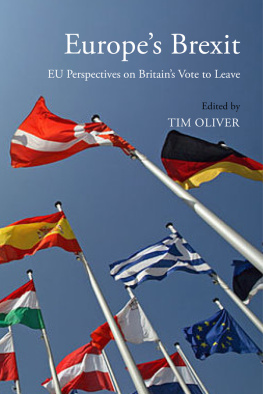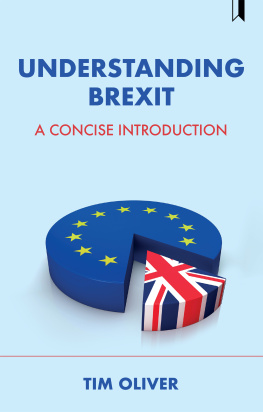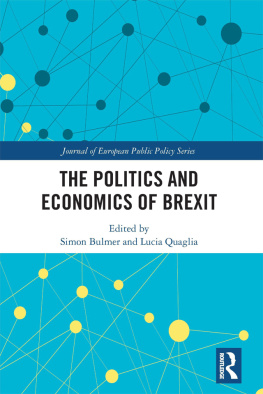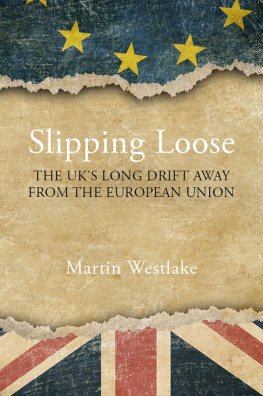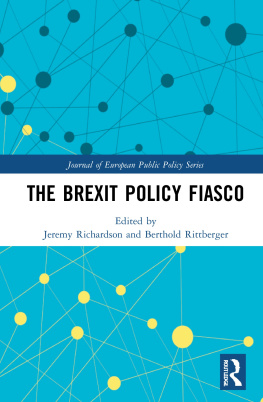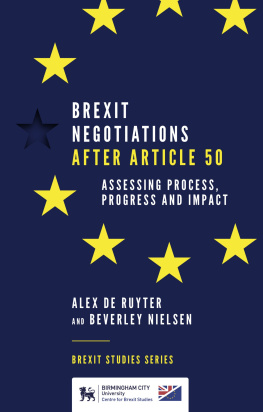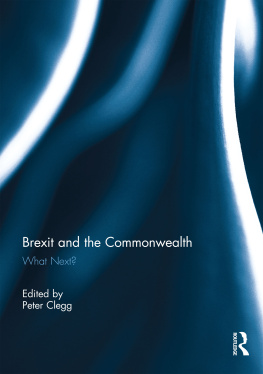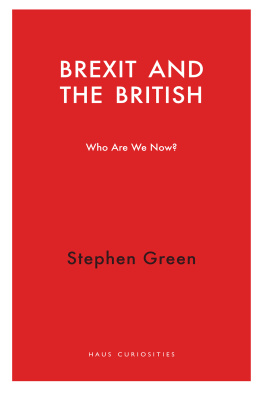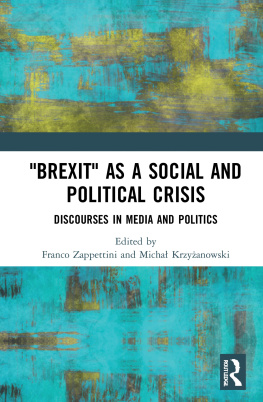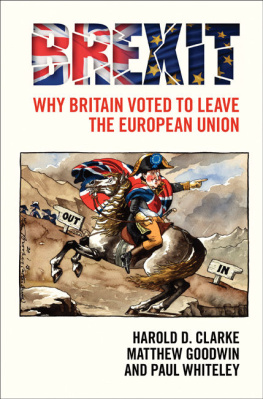EUROPES BREXIT
EUROPES BREXIT
EU Perspectives on Britains Vote to Leave
Edited by
TIM OLIVER
2018 Tim Oliver; individual chapters, the contributors
This book is copyright under the Berne Convention.
No reproduction without permission.
All rights reserved.
First published in 2018 by Agenda Publishing
Agenda Publishing Limited
The Core
Science Central
Bath Lane
Newcastle upon Tyne
NE4 5TF
www.agendapub.com
ISBN 978-1-78821-052-2
British Library Cataloguing-in-Publication Data
A catalogue record for this book is available from the British Library
Typeset by Out of House Publishing
CONTENTS
Tim Oliver
Nicolai von Ondarza
Andrew Gilmore
Vivien Pertusot
Agata Gostyska-Jakubowska
Yann-Sven Rittelmeyer and Fabian Zuleeg
Rem Korteweg, Fabian Willermain, Alexander Mattelaer and Martine Huberty
Henrik Larsen, Juha Jokela and Gran von Sydow
Eleanora Poli, George Tzogopoulos, Adonis Pegasiou and Roderick Pace
Antnio Raimundo and Laia Mestres
James Dennison, Ieva Grumbinait and Tim Oliver
Arnold Kammel, Vladimir Bartovic, Zoltn Glik and Vladimir Bilik
Antoinette Primatarova, Senada elo abi, Agnes Nicolescu and Marko Lovec
Tim Oliver
This book would not have been possible without the encouragement, support and patience of Alison Howson at Agenda. Our grateful thanks to her for all her help. The origins of the book can be traced back to a report published by the DGAP in 2014 and a series of blog posts that followed in 2015 and 2016 on the LSEs EUROPP blog and Brexit blog. We are grateful to the DGAP and the editors of both blogs for the opportunity to publish analysis as events unfolded. Thanks to Alex Boyle for research assistance. And our thanks to President Van Rompuy for providing the book with a foreword.
| ABBL | Luxembourg Associations of Banks |
| ALFI | Luxembourg Association of Funds |
| CETA | EUCanadian Comprehensive Economic and Trade Agreement |
| COSAC | Conference of Parliamentary Committees for Union Affairs of Parliaments of the European Union |
| CSDP | Common Security and Defence Policy |
| DGAP | German Council on Foreign Relations |
| EBA | European Banking Authority |
| ECFR | European Council on Foreign Relations |
| ECJ | European Court of Justice |
| ECR | European Conservatives and Reformists |
| EEA | European Economic Area |
| EEC | European Economic Community |
| EFTA | European Free Trade Association |
| ESDP | European Security and Defence Policy |
| EMA | European Medicines Agency |
| EMU | Economic and Monetary Union |
| EP | European Parliament |
| EPP | European Peoples Party |
| FCO | Foreign and Commonwealth Office |
| HMG | Her Majestys Government |
| NATO | North Atlantic Treaty Organization |
| ONS | Office for National Statistics (UK) |
| PiS | Law and Justice Party (Poland) |
| QMV | qualified majority voting |
| SME | small and medium-sized enterprise |
| V4 | Visegrd Four Group (Czech Republic, Hungary, Poland and Slovakia) |
| WTO | World Trade Organization |
Herman Van Rompuy
President of the European Council, 20092014
Brexit is full of surprises. The result was a surprise even for the Leavers. For me and many others, it was a sad surprise. No longer was the European Union an irreversible project. It was established to create irreversible economic and political bonds for the sake of an ever-lasting peace. The Union embodied values, and the most important of all was: peace. The EU was and is much more than an economic added value. The Union is not an aim in itself. It is a peace project. Brexit has national sovereignty as a goal in itself. If the EU falls apart, peace is not guaranteed. It is a sad thing that the Brexit debate is mainly about trade and the City of London. Much more is at stake.
It was a happy surprise that support for EU membership amongst the citizens of the remaining 27 member states increased dramatically after Brexit. For a large majority of them, Brexit was not a template. It would add instability to an already unstable world. The EU had become part of our DNA, even if we lack enthusiasm for it. For young people, a return to the old world of borders and national currencies seems unworldly. If any Britons thought that Brexit would be the beginning of the end of the EU, the start of the unravelling process, this was not the case. It was the first in a long series of miscalculations on the part of some in Britain.
Another surprise was the unity of the remaining 27 member states during the first phase of the Brexit negotiations. Britain is negotiating with a bloc that speaks with one voice. It means that we have an answer to Henry Kissingers question Who do I call if I want to speak to Europe?. You can now call Brussels! By contrast, Britain speaks with many voices and is not so united anymore. It is obvious that in the talks on the future EUUK relationship the EU has to work hard to remain united, but we are used to compromise. The EU is based on compromise. Compare this with the United States today, which is falling apart into two opposed groups because compromise is no longer possible.
Our British friends were surprised about their weak negotiating position. The main reason is that the United Kingdom is economically much more dependent on the EU27 than vice versa: 45 per cent of UK exports go to the EU27, while only 8 per cent of EU exports go to the UK. The EU will also remain the biggest single market in the world, even after Brexit. The euro is the worlds second currency. The economies of the Eurozone are doing well, and 8 million jobs were created between 2014 and 2018. The EU27 are negotiating with self-confidence and in unison. Therefore, it is not a surprise that Britain accepted the EUs proposals on the status of its citizens in the UK and on the divorce bill. It should also be noted that the EUs proposals were not extravagant.
From day one after the referendum it was clear that an arrangement was needed to cover the period between Brexit and an agreement on the future relationship. Now it is clear that there is no alternative than to stay in the single market and in the customs union during the transition. Negotiating a bespoke transitional arrangement could be as difficult as discussing the future relationship. Even two years will be a short time to negotiate that new relationship. It can always be prolonged. All this was known in advance. It took time for some in Britain to acknowledge reality.
The British position is also affected by the breakdown of the special relationship with the United States. The policy differences with the US president were and are huge. The most striking example is trade. The UK wants to become the champion of free trade at a moment when the Trump administration is pushing the USA towards protectionism. At the same time the EU finalised a trade deal with Japan, the biggest ever in its history. Other free trade agreements (FTAs) are in the pipeline. Never forget that FTAs are mainly about goods, but British industry is only half as important as those in many other European countries. It is in services that the UK economys strength lies, and agreement on services in an FTA is extremely difficult to secure.

